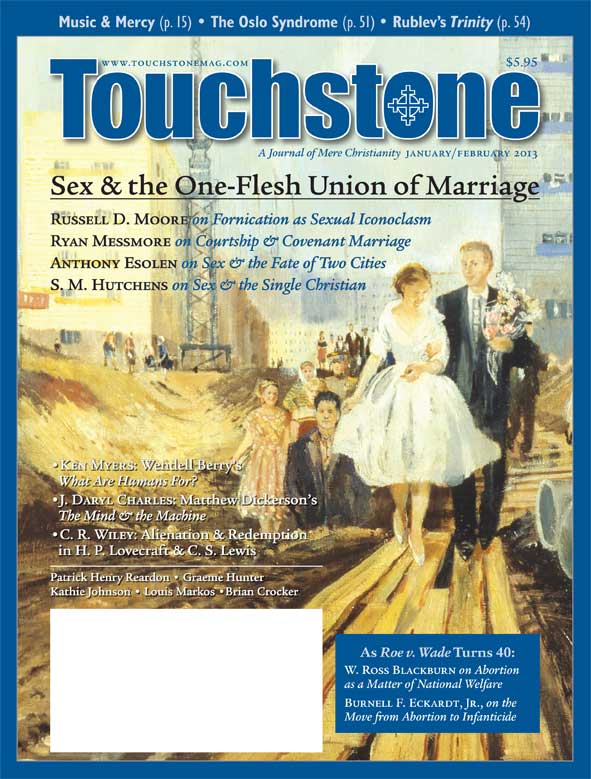Feature
Lost & Found
In the Cosmos
The Alternate & Alternative Worlds of
H. P. Lovecraft & C. S. Lewis
by C. R. Wiley
Recently some astronomers discovered two earth-sized planets orbiting Kepler-20, a star roughly 1,000 light years away. Congratulations to them; their detective work was nearly as awe-inspiring as the news. A flurry of articles followed the find, speculating on the nature of these worlds, along with a little speculation on whether or not we will ever get to them for some firsthand research. Almost immediately another flurry followed, speculating on the significance of the find for our world. Predictably, the religious were informed that they must readjust their doctrines to make room for extraterrestrial life, the writers apparently unaware that the religious have always believed in extraterrestrial life.
The whole thing reminded me of a similar phenomenon that occurred some hundred years ago, when earlier astronomers announced similar findings. The worlds they discovered were not so far away, but they were no less alien. Interest was so pervasive that even literary types took up the subject. Two writers to do so were H. P. Lovecraft and C. S. Lewis.
The two men, in many ways, were opposites. Lovecraft was a recluse from an old New England family, deeply insecure, an autodidact keenly aware of the gaps in his education. Lewis was a boisterous and gregarious man, classically educated in English boarding schools, a public intellectual justly celebrated in his own time.
Yet both had experienced childhood loss, Lewis losing his mother at age ten and Lovecraft his father to mental illness at age three and ultimately to death when he was almost eight. As children, both were sensitive boys with rich imaginative lives. Both, amazingly, married Jewish admirers and later lost those wives, Lewis famously losing Joy Davidman to cancer and Lovecraft losing Sonia Greene due to his incapacity to provide for a wife when doing so was both a cultural expectation and a practical necessity. And they were contemporaries, sharing the same cultural moment; Lovecraft was born in 1890 and Lewis in 1898. Finally, of course, both were pioneers of the fantastic, writing fantasy, science fiction, and in the case of Lovecraft, horror.

Lovecraft's Legacy
While Lewis is known to Christians as an apologist for the Christian faith, he is better known to the world for his Narnia stories. The richness and depth of those stories provide a witness to permanent things amid the ephemera of popular culture.
Now popular culture is a large and variegated thing, and while there are huge regions where Lovecraft is unknown, there are dark, subterranean recesses where he looms gigantic. Those who frequent comic-book conventions, Wiccan chat-rooms, and tattoo parlors either know of him or have felt his influence. Frequent references in Lovecraft's stories to the fictional Necronomicon, the book of forbidden lore by the mad Arab Abdul Alhazred, as well as to the equally fictitious Cthulhu Mythos, have inspired an impressive body of fan fiction.
That Lovecraft has acquired a level purchase among people who are "into that sort of thing" is not surprising. But when several best-selling authors, including Stephen King and Neil Gaiman, call you an inspiration, you are important. And when Penguin Classics publishes a selection of your short stories, and Brown University maintains a repository of your papers, as is the case with Lovecraft, it is safe to say you have arrived.
The Plausibility of Alien Worlds
C. R. Wiley is a pastor living in the Pacific Northwest. He is the author of The Household and the War for the Cosmos and In the House of Tom Bombadil. He is also a co-host of The Theology Pugcast. He is a senior editor of Touchstone.
subscription options
Order
Print/Online Subscription

Get six issues (one year) of Touchstone PLUS full online access including pdf downloads for only $39.95. That's only $3.34 per month!
Order
Online Only
Subscription

Get a one-year full-access subscription to the Touchstone online archives for only $19.95. That's only $1.66 per month!
bulk subscriptions
Order Touchstone subscriptions in bulk and save $10 per sub! Each subscription includes 6 issues of Touchstone plus full online access to touchstonemag.com—including archives, videos, and pdf downloads of recent issues for only $29.95 each! Great for churches or study groups.
Transactions will be processed on a secure server.
more on C. S. Lewis from the online archives
more from the online archives
calling all readers
Please Donate
"There are magazines worth reading but few worth saving . . . Touchstone is just such a magazine."
—Alice von Hildebrand
"Here we do not concede one square millimeter of territory to falsehood, folly, contemporary sentimentality, or fashion. We speak the truth, and let God be our judge. . . . Touchstone is the one committedly Christian conservative journal."
—Anthony Esolen, Touchstone senior editor














